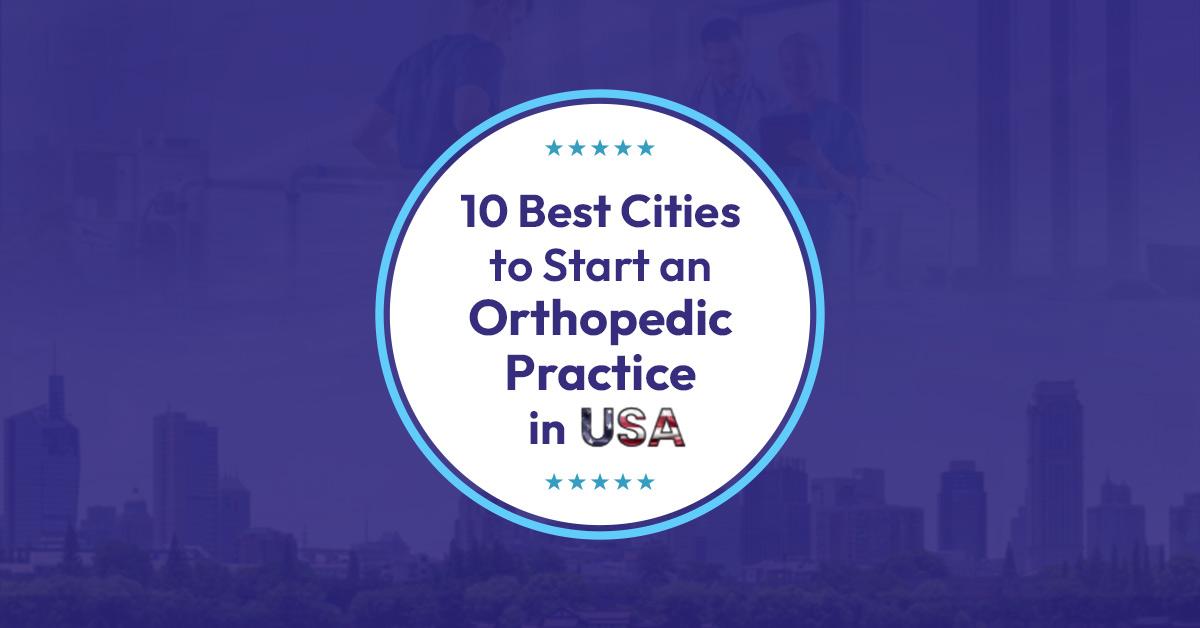Imagine you’ve just completed a fellowship, received your certificate/diploma, and are finally ready to hang your shingle and start your orthopedic practice or a career as an orthopedic surgeon.
But as you sit down with a strong cup of coffee, reality hits—where should you do it?
Picking the proper city isn’t just throwing a dart at a map.
It’s more like a surgical strike—you need precision, strategy, and a solid plan.
You could chase the big bucks in California, but remember, not all that glitters is gold.
Or maybe you want to go where competition is thinner, and your impact can be bigger.
Perhaps you’re looking for quality of life and career potential—a place to get peace of mind.
Where you choose to launch your orthopedic career can make or break your success.
From high salaries and booming populations to manageable overhead and supportive healthcare ecosystems, the city you call home will shape your growth, income, and work-life balance for years to come.
Today, we’re diving into the best Cities to Start an Orthopedic Practice or a job as an orthopedic surgeon.
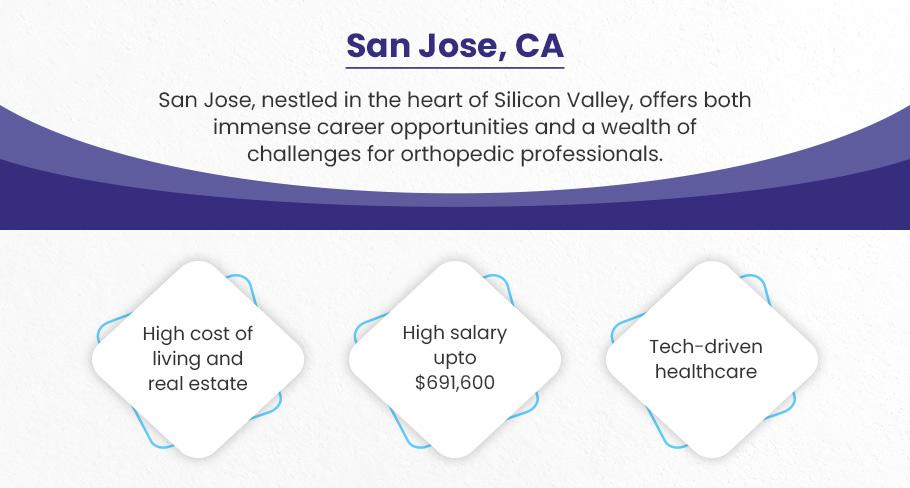
1). San Jose, CA
Thinking about where to build your future clinic, you might wonder if San Jose is the best city for orthopedic surgeons. The paycheck here answers fast. Recent data puts average annual compensation near $702k, which is one of the highest figures in the country.
Money is only the first draw. Silicon Valley patients live online and love gadgets, so they look for robotic joint replacement, AI-based imaging reads, and app-driven rehab. You can test new tools, publish quick studies, and even pick up equity when local device start-ups need clinical partners.
Business growth feels brisk too. A large, active population with healthy insurance plans keeps appointment books full, and being near Stanford or Kaiser adds referral traffic if you focus on a niche such as sports injuries for tech workers or outpatient total joints. All of this helps San Jose stay on most “best place to practice orthopedic surgery” lists.
Now let’s keep the picture honest… that seven-figure vibe fades when you shop for a house. Zillow shows a median home price around $1.48 million. Groceries, rent, and child care follow the same pattern, leaving overall living costs roughly 80 percent above the national average. Operating overhead tells the same story: lease rates and staff salaries rise with the tech boom, while big systems already hold many prime OR blocks.
Carve out clear branding, secure solid capital, and maybe open the office a few miles south where rents drop. Break through those barriers and San Jose can still prove the best city for orthopedic surgeons who thrive on innovation.
Pros:
- Average pay tops $700k, far above national norms
- Tech-forward patients welcome robotic surgery and tele-rehab
- High insurance coverage fuels steady case volume
- Close ties to venture-backed device firms offer research and equity
Cons:
- Median home price sits near $1.48 million
- Living costs hover about 80 percent above the U.S. mean
- Fierce competition from Stanford, Kaiser, and Sutter for OR time
- Start-up practice costs run high for space, imaging, and staff
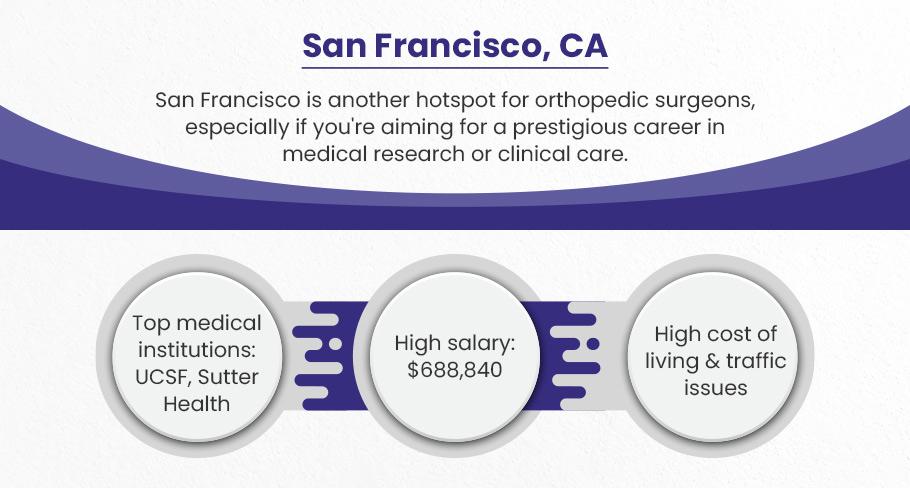
2). San Francisco
If you’re chasing prestige and professional growth, San Francisco might just be the best city for orthopedic surgeons. With an average salary of around $695,000 a year, you’d be sitting near the top of the national earnings chart.
What makes it even more compelling is the company you’d keep. You could find yourself treating patients right next to the UCSF Medical Center, a U.S. News Honor Roll hospital that consistently ranks among the top in orthopedics. Walk a few blocks and you’re in Sutter Health territory—meaning high-volume patient flow, cutting-edge research, and complex clinical cases right at your doorstep.
The patient population is just as dynamic. On any given day, you’ll see tech professionals with repetitive strain injuries, amateur athletes needing ACL reconstructions, and older adults lining up for joint replacements. Thanks to San Francisco’s high rate of private insurance coverage, your clinic stays busy, and reimbursements stay strong. This is also the kind of city where you can try robot-assisted surgeries or app-based post-op rehab and patients will embrace it.
But then comes the trade-off.
Living here is a serious financial commitment. The median home price is around $1.29 million, and daily expenses sit about 65% above the U.S. average.
Even before your first patient of the day, the city can wear you down. In 2024 alone, drivers lost 46 hours to traffic delays, cutting into clinic hours and adding stress to an already demanding schedule.
Thinking of starting your own practice? Brace yourself. Lease rates, staff salaries, and imaging overhead all scale with San Francisco’s high cost of living. Plus, major hospital systems dominate the surgical market, leaving fewer open doors for newcomers. If you want to break through, you’ll need a well-defined niche—something like outpatient total joints, sports medicine, or regenerative orthobiologics.
That said, if you carve out your space, you just might end up calling San Francisco the best place in the country to build an orthopedic career.
Pros:
- Top-tier pay near $695,000
- Access to UCSF and Sutter research and referral networks
- Well-insured, diverse patient base with complex needs
- Opportunities to lead in robotics and tele-rehab innovation
Cons:
- $1.29 million median home price and high day-to-day expenses
- Around 46 hours lost annually to traffic congestion
- Intense competition for OR time and specialty referrals
- High overhead costs for starting an independent practice
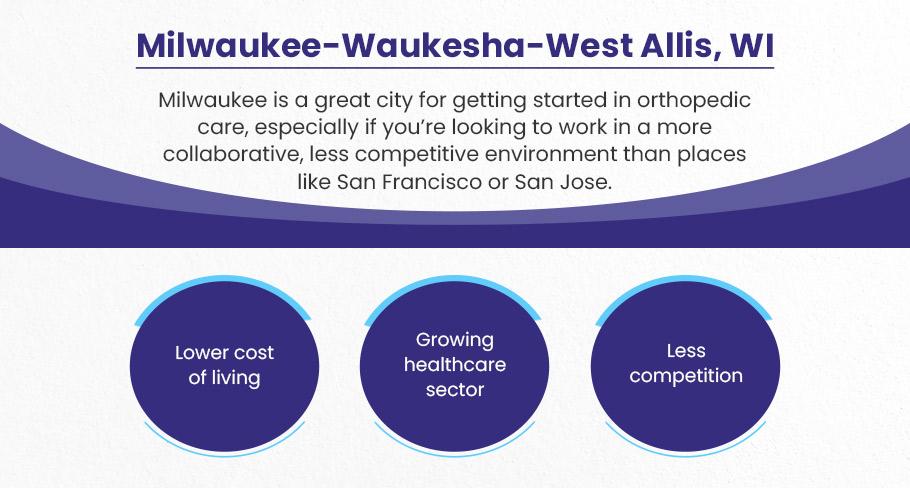
3). Milwaukee-Waukesha-West Allis, WI
If you’re thinking about the most profitable city for orthopedic surgeons that still lets you breathe financially, Milwaukee-Waukesha-West Allis deserves a serious look. The average orthopedic surgeon salary here is about $557,000 a year, giving you a strong income to work with. Even better, the cost-of-living index hovers around 88, meaning expenses are roughly 12% lower than the national average. Groceries, housing, and even clinic rent tend to cost less, which stretches your income further.
That breathing room pairs nicely with a growing healthcare scene. Systems like Froedtert Health continue expanding across southeast Wisconsin, including an $84 million new campus currently under development. More sites mean more referrals, and with Wisconsin’s aging population, you’ll find steady demand for joint replacements, sports injury repairs, and spinal procedures—exactly the kind of caseload that builds a thriving practice.
Another bonus? You won’t be elbow-to-elbow with a dozen large ortho groups. The local market is less saturated, giving you room to build a recognizable brand. Open your own clinic, partner with local marathons or schools, and word spreads fast in this community. Startup costs are also more forgiving, so you can invest in essentials like digital imaging, outpatient joint kits, or physical therapy integration without taking on overwhelming debt.
Of course, there are trade-offs. Milwaukee isn’t a research powerhouse like the coasts, so access to cutting-edge trials and devices may come a bit later. Patient volume isn’t as high as in major metros, and you’ll see fewer ultra-high-income cases. But if you focus on a clear niche—like sports medicine for student athletes or rapid-recovery joints—you can still keep your calendar full and your practice on solid ground.
Pros:
- Average salary around $557,000 with below-average living costs
- Expanding networks like Froedtert drive consistent referrals
- Fewer orthopedic competitors means easier brand visibility
- Lower startup costs for space, equipment, and staffing
Cons:
- Fewer research trials and academic ties than coastal cities
- Smaller volume of high-net-worth patients
- Harsh winters may impact recruitment or patient flow
- Travel to major ortho conferences takes longer than from cities like Chicago
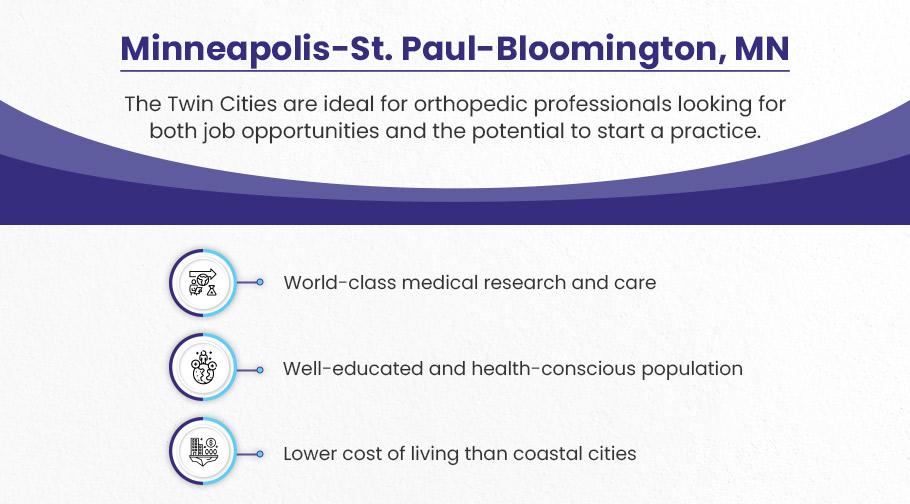
4). Minneapolis–Saint Paul
Picture yourself in the Twin Cities, where you could walk the halls of the Mayo Clinic, still be home for dinner, and keep more of every paycheck. The average orthopedic salary ranges from about $460,000 to $755,000 a year, and everyday costs run about 6% below the national average. That means your income stretches farther than it would in coastal metros like San Francisco or New York.
The area’s population adds even more upside. With a well-educated, fitness-focused community, you’re likely to see steady demand for joint replacements, ACL repairs, and spine procedures. And with the Mayo Clinic ranked No. 2 in the nation for orthopedics, you’re also looking at strong opportunities for collaboration, research involvement, and clinical prestige.
If you’re thinking about opening your own clinic, the numbers work in your favor. Compared to other major cities, office rents, imaging leases, and staff wages are lower. Yet hospital systems keep expanding, and Minnesota’s aging population ensures a consistent flow of referrals. Carving out a niche in outpatient joint replacements or sports medicine for student-athletes could give you an edge, even with major players like Mayo and Allina already established.
That said, competition is no joke. The market can feel crowded with long-standing groups. You may wait for operating-room blocks, and device trials often debut in Rochester before drifting up I-35. Even so, many surgeons still call Minneapolis-St. Paul the best city for orthopedic surgeons who want top-tier medicine without West-Coast price tags.
Pros:
- Strong pay: up to $755 k while costs stay below national average
- Access to Mayo Clinic research, trials, and prestige boosts
- Health-conscious population keeps case volume steady
- Lower start-up costs make private practice realistic
Cons:
- Market feels saturated; OR time can be tight
- Big academic systems dominate complex cases
- Some cutting-edge device trials reach Rochester first
- Cold winters may deter recruits and patients looking for sunshine

5). Phoenix-Mesa-Scottsdale, AZ
Think warm desert air. Golf all year. And a steady stream of knees and hips.
That’s Phoenix.
From the moment you arrive, it feels busy—in a good way. The retiree population keeps joint-replacement demand strong, and it’s still growing. According to state projections, Arizona’s 65+ population will keep rising through at least 2026. So the work? It’s not slowing down anytime soon.
What about pay? Pretty solid. The average orthopedic salary in Phoenix is about $550,000. Meanwhile, the cost of living here is just 6% above the national average. That makes Phoenix feel affordable—especially compared to places like LA or NYC. Your paycheck goes further. Rent, mortgages, clinic space—even golf—cost less.
Jobs are everywhere. Big names like Banner and HonorHealth are hiring. At the same time, outpatient surgery centers are booming. Becker’s tracks over 600 ASCs doing total joints across the U.S., and Phoenix is one of the top spots. You can join a group, co-own a center, or launch a sports-medicine clinic without drowning in coastal-level startup costs.
But here’s the catch.
Phoenix is no secret. More surgeons move in each year. Referrals don’t flow as freely as they used to—especially around busy ASCs. If you want to stand out, you’ll need a niche. Think: same-day hips, biologic knee cartilage, or concierge rehab for the pickleball crowd.
Get that right, and Phoenix might just be your perfect orthopedic-friendly city to practice.
Pros:
- Average salary around $550k with manageable living costs
- Retiree-heavy population keeps case volume steady
- Growing ASC and hospital networks offer flexible job options
- Startup costs stay low for private practices
Cons:
- Referral competition is heating up
- ASCs may limit hospital OR availability
- Long, hot summers aren’t for everyone
- Fewer early-phase research trials compared to academic hubs
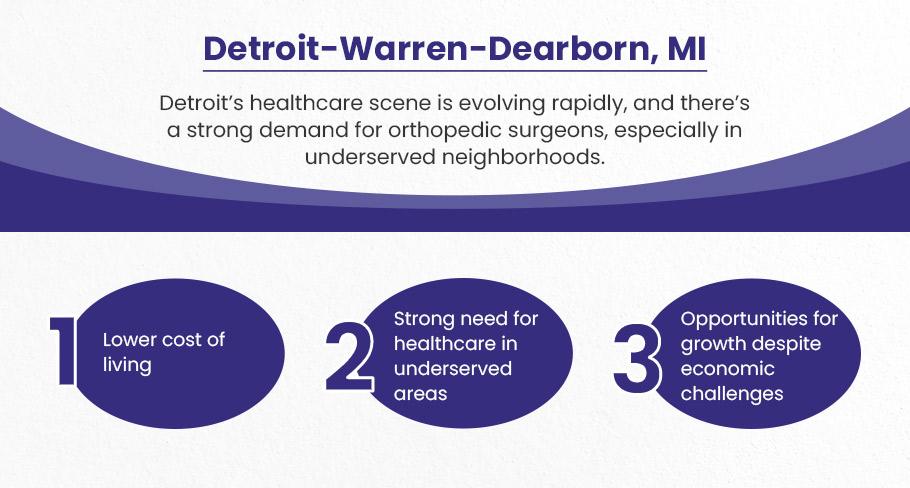
6). Detroit-Warren-Dearborn
Looking for real impact and good income? Detroit-Warren-Dearborn might surprise you.
The average orthopedic salary here is around $557,000, and living costs are close to the national average. Compared to the coasts, everything from housing to clinic space feels way more affordable.
But the real difference is the need.
Detroit still has many federally designated shortage areas. People often drive long distances just to see a specialist. If you’re an orthopedic surgeon, you’re needed the minute you show up. That makes Detroit feel like the best place to build a meaningful practice that actually helps people.
The city’s revival also works in your favor. Clinic space rents are reasonable. Hospitals are open to community partnerships. You can set up in an underserved neighborhood, host rehab events, and your name spreads fast. You build trust quickly and keep overhead low while doing it.
Still, there are trade-offs. Some patients struggle with co-pays, so not every case brings top-tier reimbursement. Device trials and premium implants usually roll out on the coasts first. And yes, winters are long and snowy, which might slow down visiting fellows or referral partners.
But if you carve out a niche like trauma care for factory workers or mobile follow-up for joint replacements, then you can stand out and grow fast.
Pros:
- Strong salary around $557k with affordable living costs
- Huge demand in shortage zones means instant patient volume
- Low startup costs for office space, equipment, and staffing
- Community outreach builds your name and trust quickly
Cons:
- Some patients may have limited ability to afford high-end care
- New implant/device trials often reach Detroit after coastal hubs
- Harsh winters can be a downside for new hires or patient travel
- Economic shifts may affect local insurance coverage
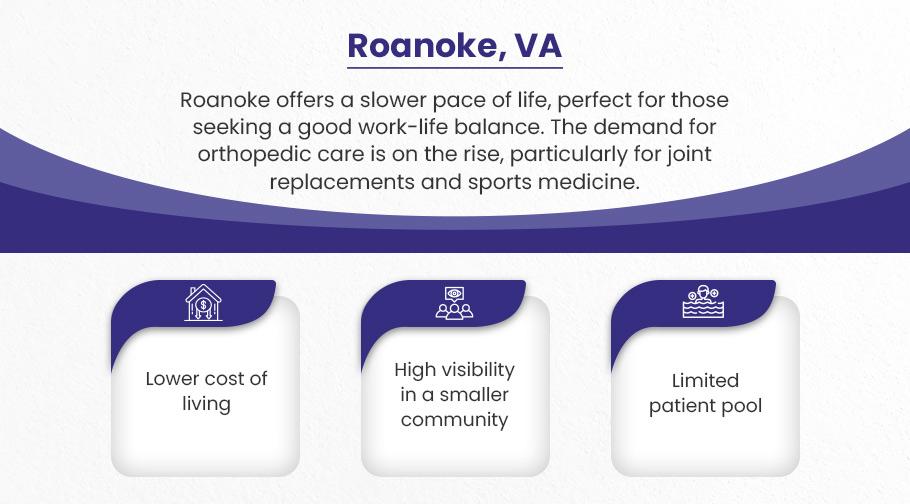
7). Roanoke, VA
Want a calmer pace, good pay, and space to grow? Roanoke checks those boxes.
The average orthopedic salary here is about $513,000, and living costs run roughly 9% below the national average. That means your money stretches farther—for housing, schools, even clinic rent. For orthopedic surgeons who want balance, this smaller city might feel just right.
And there’s real demand.
Carilion Clinic keeps expanding, including a major new hospital tower coming in 2025. More space means more OR access and more referrals. Fewer local surgeons means less competition, too. In a metro area with around 315,000 people, word-of-mouth travels fast. Offer joint replacements or sports care, and you could become the go-to ortho within a year.
Still, Roanoke has limits.
The population is smaller, so you won’t see as many complex or high-end cases. Device trials usually hit bigger cities first. And some patients or payers might have tight budgets. But if you’re building from the ground up, with a focus on community and lifestyle, Roanoke gives you the freedom to grow without the pressure of a crowded market.
Pros:
- Average salary around $513k with below-average cost of living
- Carilion’s growth brings more referrals and OR time
- Low competition helps you build a fast reputation
- Startup costs stay low for rent, staff, and equipment
Cons:
- Smaller population means fewer advanced cases
- Big device trials may reach here later
- Budget limitations can affect payer mix
- Growth may plateau once the local market is captured

8). Sacramento–Roseville–Arden-Arcade, CA
Sacramento feels like the middle lane on California’s freeway. You’re still in the Golden State, but your paycheck stretches a lot further.
The average orthopedic salary here is around $527,000. Meanwhile, cost of living is about 33% lower than San Francisco. That’s a huge gap—especially when it comes to rent, groceries, or starting a clinic. For surgeons who want California perks without the superstar price tag, this area hits a sweet spot.
The patient base is growing too. The metro population passed 2.26 million in 2025 and it keeps inching upward. UC Davis Health just broke ground on a new 14-story hospital tower, and Sutter is building a downtown sports-medicine complex. More beds, more clinics, and more referrals is a great news if you do joint replacements, spine care, or fracture work.
And unlike coastal cities, office rent and staff wages stay manageable. That makes it easier to open your own practice without draining your savings.
Still, growth attracts competition.
Big hospital groups and outpatient surgery centers are already busy claiming turf. To stand out, you’ll need a clear angle, umm, maybe same-day knees, biologic repairs, or ergonomic care for California’s state workers. If you can find your lane, Sacramento gives you room to grow without the burnout.
Pros:
- Strong average pay near $527k with lower costs than SF or LA
- Population is rising, driving steady demand
- Big investments from UC Davis and Sutter mean more OR access
- Lower startup costs for office space and staffing
Cons:
- Growing competition from hospitals and ASCs
- Need to carve out a niche to stay booked
- Fewer early research trials compared to the big-name academic centers
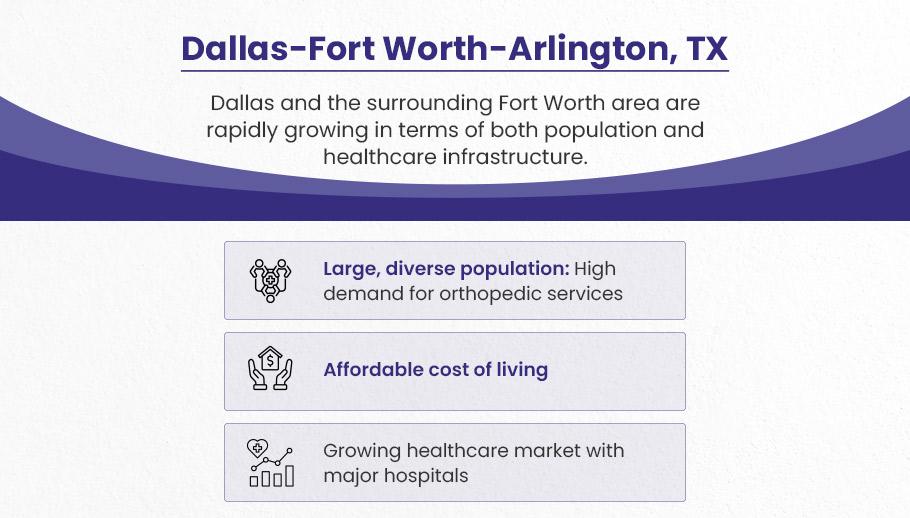
9). Dallas-Fort Worth-Arlington, TX
You want plenty of cases, solid pay, and bills you can actually manage. Dallas-Fort Worth makes a strong case.
The average orthopedic salary here is about $550,000, and living costs are just slightly above the national average. That means your paycheck stretches a lot more than it would on the coasts.
The metro population now tops 6.7 million—and it’s still growing. About 1% every year. That’s a huge base of knees, hips, and sports injuries waiting for help.
Jobs? You’ve got options.
Big health systems like Baylor Scott & White and Texas Health Resources are expanding fast. Baylor’s new medical center on PGA Parkway opens this summer. Texas Health’s Justin Tower adds tons of ortho-ready ORs. That means more operating room time, research partners, and steady referrals for new orthopedics.
If you’re thinking about opening your own place, Dallas is friendly to startups. Office space and staffing costs are much lower than California, so buying into an ASC or launching a clinic won’t leave you buried in debt. Plus, the population stays active—think joint replacements, spine care, and sports medicine for kids and teens.
But it’s not all easy.
Competition is real. New ASCs are popping up all the time, and other surgeons are chasing the same total-joint cases. To stay ahead, you’ll need a niche or standout patient care. And the heat? Summers here are long and hot, which can be a dealbreaker for some staff and patients.
Pros:
- Average salary around $550k with manageable living costs
- Large, growing metro with strong case demand
- Big hospital expansions offer OR time and referrals
- Lower startup costs compared to coastal cities
Cons:
- Competition from fast-growing ASC and ortho groups
- Hot summers may impact recruitment and patient volume
- You’ll need strong branding or a subspecialty to stand out

10). Charlotte-Concord-Gastonia, NC
Charlotte hits a sweet spot if you want big-city medicine without big-city prices.
The average orthopedic salary here is around $538,000, and living costs are just slightly below the national average. That combo means your paycheck actually goes somewhere—unlike in San Francisco or New York.
Job options? Plenty.
Atrium Health is building a new care tower and adding more surgical suites. Novant and OrthoCarolina are hiring too. Whether you want hospital work, an outpatient clinic, or an ASC, you can get started quickly.
Thinking about opening your own place? Charlotte’s population is growing fast—about 117 new residents move in every day. That means more knees, hips, and sports injuries to treat. Office rent and staff wages stay lower than in coastal cities, so starting a private clinic feels doable. Families here care about staying active, so if you offer sports medicine, pediatric ortho, or fast-track joint recovery, you’ll stand out.
There’s just one thing: others are catching on.
More surgeons and ASCs are moving in, which makes referrals harder to secure. You’ll need a clear niche or strong service style to stay top-of-mind. But get it right—and Charlotte becomes one of the best places to grow your ortho career and still have time for life outside the clinic.
Pros:
- Solid average pay around $538k with affordable living costs
- Atrium Health expansion means more OR space and referrals
- Fast-growing population feeds consistent patient demand
- Lower rent and wages make private practice more realistic
Cons:
- Rising number of surgeons and ASCs increases competition
- Fewer high-level research opportunities than big academic centers
- You’ll need strong branding or a subspecialty to stay ahead
Key Factors to Consider When Choosing a Location
Thinking about where to live and work as an orthopedic surgeon in the U.S.?
The city you choose can shape your professional growth, lifestyle, and long-term financial health.
So before packing your bags and booking your onward ticket, you must know the essential factors that should be on your radar:
- Average Salary
When evaluating cities, look at the average salary for orthopedic surgeons. Higher wages often reflect a stronger demand for orthopedic care and a healthier reimbursement environment.
But don’t stop there—dig deeper. Ask yourself:
Is the higher salary tied to longer work hours?
Does it come with better resources or more administrative headaches?
For example, orthopedic surgeons in cities like San Francisco or New York might earn top dollar, but higher living costs and more rigid licensing rules can offset that income.
- Population Growth
A growing city often means an ever-increasing patient base: more families, aging populations, and sports-related injuries—all great news for orthopedic practices.
For example, Charlotte, NC, attracts young professionals and retirees who could benefit from orthopedic care. Think of population growth as planting your practice in fertile soil—the more the community grows, the more your patient list can flourish.
- Healthcare Infrastructure
Being near hospitals, surgery centers, and physical therapy clinics can significantly boost your practice’s accessibility and referral network.
It’s also more convenient for your patients, which increases retention.
A physician moved his orthopedic clinic to Manistee, MI because it placed him beside the hospital.
That proximity improved patient access and made scheduling surgeries more efficient.
- Competition
You’ll want to evaluate how many orthopedic surgeons are already practicing there.
A saturated market can make it harder to establish yourself—especially if you’re starting a solo practice.
On the flip side, underserved areas might offer golden opportunities, mainly if you specialize in sports medicine, joint replacement, or spine surgery.
Research the local demand and consider what makes your approach unique—then find a city where that niche is in need.
- Cost of Living
A high salary sounds great—until you realize your rent, taxes, and staff wages are equally high. That’s why the cost of living matters.
Cities with a lower cost of living can significantly boost your take-home income and reduce the pressure on your practice’s bottom line.
For example, setting up shop in Tulsa, OK, could mean lower rent, more affordable housing, and a higher quality of life without sacrificing earning potential.
Top 10 U.S. Cities for Orthopedic Surgeons: Quick Comparison Guide
Looking for the right place to grow your orthopedic career or launch a new practice? Here’s a quick-glance summary of the best cities across the U.S.
| City | Verdict |
| San Jose, CA | Best for surgeons who thrive on innovation, tech-forward patients, and startups. |
| San Francisco, CA | Best for those chasing prestige, top-tier research, and elite clinical exposure. |
| Milwaukee, WI | Best for financial breathing room, low overhead, and steady Midwest demand. |
| Minneapolis–Saint Paul, MN | Best for blending academic prestige with affordable, high-volume practice. |
| Phoenix, AZ | Best for warm weather, retirees, and booming outpatient surgery growth. |
| Detroit, MI | Best for making real community impact in high-need, low-cost areas. |
| Roanoke, VA | Best for work-life balance and building a practice from the ground up. |
| Sacramento, CA | Best for California perks without coastal price tags and room to grow. |
| Dallas-Fort Worth, TX | Best for case volume, major expansions, and business-friendly practice setup. |
| Charlotte, NC | Best for career growth in a fast-growing, family-friendly metro with room to shine. |
